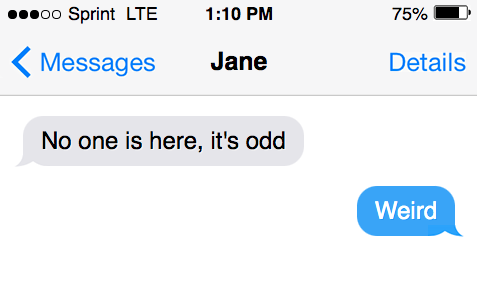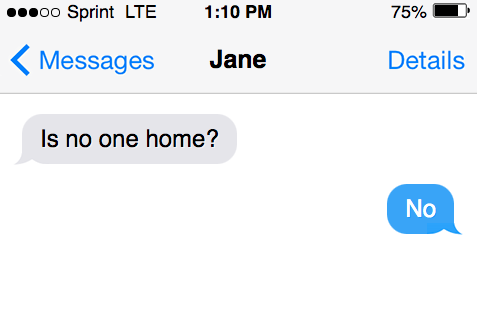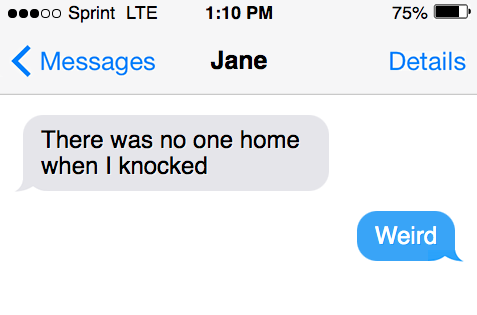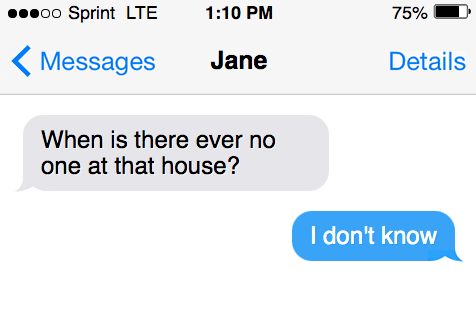Is it “noone” or “no one?” When you’re working on becoming a better writer, you naturally want to ensure you’re using the correct spelling and grammar in your writing.
In some cases, it can be confusing to know what version of a term is the correct way to spell it.
For example, is the acceptable way to spell the term “noone” or “no one”?
Does the double “o” make that much of a difference?
Or is the term always split into two words?
To avoid confusion while working on your next writing assignment, learn everything there is to know about the differences between “noone” and “no one.”

“No one” correct spelling: two words
The correct version of “noone” or “no one” is the latter. Referring to “not any person.”
That said, the two-word version of “no one” is the most commonly used spelling of the term in the English language.
Although there may not seem like there is a huge distinction between “noone” and “no one,” the latter is the correct word to use.
Can you use “noone” in writing?
Put simply, the one word version spelled “noone” is not an alternative spelling of “no one.”
Rather, the one word spelling is a common misspelling of the word.
“Noone” is the incorrect way to spell “no one,” so there is no definition for this term in the English dictionary.
It may seem like it’s not a big deal to combine the two words.
After all, “no one,” “noone” look like they would have the same pronunciation and meaning.
However, remember that “noone” is incorrect, and the space between the two terms makes all the difference.

Can you add a hyphen to “no one”?
Now that you understand “noone” is the incorrect spelling of “no one,” you may be curious if a hyphenated version of the word exists.
In fact, “no-one” is an alternative spelling that grammarians condone, although it is not popular to add a hyphen.
Also, keep in mind that if you want to write “no-one” in sentence, it cannot always be used to replace “no one.”
Most often, the hyphenated version of “no one” is used outside North America.
In fact, the hyphenated version of “no one” has been steadily gaining popularity (in countries outside North America) since the 1940s, but it is still far less used than “no one.”
However, using the spelling “no one” eliminates ambiguity in your writing and ensures you do not make a spelling mistake.
Commonly, if you were to add a hyphen to “no one” is would be considered an error.
Definition of “no one”
“No one” is a pronoun commonly defined as, “no person; nobody.”
Some synonyms for the indefinite pronoun include “nobody” and “none.” What are indefinite pronouns? Learn more about them here.
In contrast, a couple of antonyms for the two-word version of “no one” include “everybody” and “everyone.”

What is a pronoun?
Pronouns are all the words, such as “I,” “she,” “he,” etc., that are used to substitute a singular noun or noun phrases.
Additionally, a pronoun is a referent that is named or understood in the context of a specific sentence.
A pronoun is the term that refers the a noun that has already been mentioned to the readers.
Or, the word refers to certain nouns that do not need to be named specifically.
In the case of “no one,” this term actually acts as an indefinite pronoun.
With that, these pronouns don’t refer to a specific person or thing, but rather to an unidentified or unfamiliar person or thing.
Other cases of these types of words include “everybody,” “either,” “none,” and “something.”
Pronouns vs. nouns
As previous mentioned, the correct spelling of “no one” acts as a pronoun.
But how does this type of word differ from a noun?
In writing, a noun is a word that names people, animals, things, places, qualities, actions, and ideas.
Some examples include the words “water bottle,” “stop sign,” “letters,” and “West Virginia.”
In contrast, pronouns are words writers can use instead of nouns.
Take this comment for instance:
“You go to the store on Tuesday.”
“You” is the pronoun, while “go” is the verb, or action phrase.

When to use “no one”
Remember, adding a space between “no” and “one” is the right way to write the term.
But when should you use “no one” in your writing?
“No one” can be used to refer to a general group of people.
So, if you were to say, “No one can interpret this sign in the hallway,” you’re telling your audience that the inability to interpret the sign is something all people experience, not just a select few.
Another example is the following statement:
“Out of all 50 students in the Latin class, no one knew which were real words and which were fake.”
Again, this statement attests that every student experienced the same thing.
For instance, no one knew the real terms from the fake.
So, if you want to write a statement using the term “no one,” understand that it is used to address a large group of people/subjects.
Examples of “no one” in a sentence
It is natural to second guess when you should use “noone” or “no one” in your writing.
So, here are some statements that use “no one” correctly!
- “Does no one search for the answer in the dictionary before checking their phone right away?”
- “The prince arrived at the scheduled time, but no one was there to greet him.”
- “Unfortunately, no one knew the incoming storm was going through their hometown.”
- “No one understood which form the verb took in the exam’s test question.”
- “She was waiting for a note but no one gave her one.”
- “The new site said no one had clicked on the link in seven days.”
- “No one could carry the stick for the entire walk because there were ants on it.”
- “No one at the office understood how post navigation search worked so they had to call for answers.”
- “The sign said no one was allowed to participate in overnight crossing, but Jackie did it anyways.”
- “To Katey, the scariest thing about outer space was that no one else is out there with you.”
Why is no one commonly misspelled?
“No one” is sometimes mistakenly written as a single word because people mistake it for a compound word.
With that, compound words are terms that are used together to create a new meaning.
Some examples include “ice cream,” “doorknob,” and “short-term.”
As you can see, these terms can be written as two words, a single word, or with a hyphen to join the two terms.
Therefore, it seems like there are too many choices between “no one,” “noone,” and “no-one,” which is why the incorrect spelling is common.
Still, “no one” is the most acceptable way to spell the term.
“Noone” is always going to be wrong, no matter what its intended usage is.
Lastly, “no-one” isn’t necessary the wrong spelling depending on the context.
How to remember the correct form
Remember which word to use, “noone” or “no one,” can appear challenging.
But keep in mind that when writing “noone,” the spelling just looks awkward.
Also, think of how “noone” would be pronounced in a sentence; it wouldn’t be the same as “no one.”
Although “no one” with a hyphen between the single words is acceptable, it is not the go-to spelling of the term because it can be easily misused.
Most grammarians only spell the term “no-one” to avoid confusion in specific sentences, such as, “No one person can reach the goal alone.”
In this example, it causes the reader to stutter and backtrack to understand what the writer intended.
Extra: Is it “no one’s” or “no ones?”
Is there a distinction between “no one’s” with an apostrophe and “no ones” without one?
Put simply, yes, there is a huge distinction.
That said, “no one’s” is a contraction between the terms “one” and “is.”
For instance, you can write something like “No one’s listening in on this conversation.”
If you were to avoid using the contraction, the statement would still make sense:
“No one is listening in on this conversation.”
The only instances were you can write “ones” are when it is being utilized to mean “examples” or “people.”
For instance, “Most people look after their loved ones.”
Essentially, there is no case where you would use “no ones” in a grammatically correct statement.
Sentences using “no one’s” correctly
If you need more guidance on when or how to use “no one’s” in your writing, take a look at theses statements
- “No one’s taking Patrick’s parking space because they do not want to get yelled at later.”
- “The manager asked who wanted to work a double shift, but no one’s wanting to take on the extra work.”
- “‘No one’s excited about what I have to say,’ Ashley cried to her mom on the phone.”
Sources
- Parts of Speech: The Britannica Dictionary
- Compound Words – Grammarly
- Pronoun definition – Merriam-Webster
- No one definition – Merriam-Webster
- No one, Noone, or No-one? – Grammar Monster
- No-One, Noone, or No One – Which Is Right? – Grammarly
- Ones/one’s – Washington State University
Inside this article
Fact checked:
Content is rigorously reviewed by a team of qualified and experienced fact checkers. Fact checkers review articles for factual accuracy, relevance, and timeliness. Learn more.
Core lessons
Glossary
- Abstract Noun
- Accusative Case
- Anecdote
- Antonym
- Active Sentence
- Adverb
- Adjective
- Allegory
- Alliteration
- Adjective Clause
- Adjective Phrase
- Ampersand
- Anastrophe
- Adverbial Clause
- Appositive Phrase
- Clause
- Compound Adjective
- Complex Sentence
- Compound Words
- Compound Predicate
- Common Noun
- Comparative Adjective
- Comparative and Superlative
- Compound Noun
- Compound Subject
- Compound Sentence
- Copular Verb
- Collective Noun
- Colloquialism
- Conciseness
- Consonance
- Conditional
- Concrete Noun
- Conjunction
- Conjugation
- Conditional Sentence
- Comma Splice
- Correlative Conjunction
- Coordinating Conjunction
- Coordinate Adjective
- Cumulative Adjective
- Dative Case
- Determiner
- Declarative Sentence
- Declarative Statement
- Direct Object Pronoun
- Direct Object
- Diction
- Diphthong
- Dangling Modifier
- Demonstrative Pronoun
- Demonstrative Adjective
- Direct Characterization
- Definite Article
- Doublespeak
- False Dilemma Fallacy
- Future Perfect Progressive
- Future Simple
- Future Perfect Continuous
- Future Perfect
- First Conditional
- Irregular Adjective
- Irregular Verb
- Imperative Sentence
- Indefinite Article
- Intransitive Verb
- Introductory Phrase
- Indefinite Pronoun
- Indirect Characterization
- Interrogative Sentence
- Intensive Pronoun
- Inanimate Object
- Indefinite Tense
- Infinitive Phrase
- Interjection
- Intensifier
- Infinitive
- Indicative Mood
- Participle
- Parallelism
- Prepositional Phrase
- Past Simple Tense
- Past Continuous Tense
- Past Perfect Tense
- Past Progressive Tense
- Present Simple Tense
- Present Perfect Tense
- Personal Pronoun
- Personification
- Persuasive Writing
- Parallel Structure
- Phrasal Verb
- Predicate Adjective
- Predicate Nominative
- Phonetic Language
- Plural Noun
- Punctuation
- Punctuation Marks
- Preposition
- Preposition of Place
- Parts of Speech
- Possessive Adjective
- Possessive Determiner
- Possessive Case
- Possessive Noun
- Proper Adjective
- Proper Noun
- Present Participle
- Prefix
- Predicate



